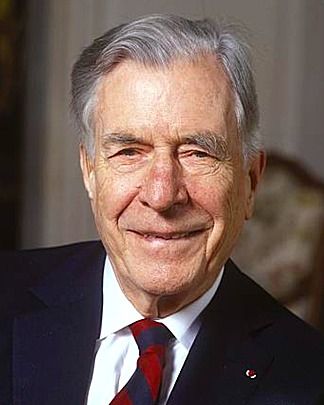
Ken Galbraith
John Kenneth Galbraith was recognized as the most scholarly economist and public servant of the 20th century, He is known for his support of public spending and for the literary quality of his writing on public affairs. He has written 46 books that collectively sold more than 7 million copies. He was also one of the most engaged and celebrated public intellectuals in America. In addition to his teaching and writing, Galbraith performed government service under, or advised, every Democratic president from Franklin Delano Roosevelt to Bill Clinton.
Ken Galbraith Professional Experience / Academic History
Professional Experience
-
Professor of Economics
Academic History
-
MS in Agricultural Economics
-
PhD in Agricultural Economics
-
BS in Animal Husbandry
EARLY LIFE
- Galbraith was born in 1908 in a small farming community in Iona Station, Ontario.
- He became a U.S. citizen in 1937.
CAREER
- Galbraith came to Harvard University in 1934 as an Instructor of Economics.
- He delved into research for the New Deal’s farm programs, and soon thereafter into the broader debates then revolutionizing economics.
- He spent a highly formative year in Cambridge, United Kingdom from 1937 to 1938, learning about the then-new Keynesian theory.
- He next taught for one year at Princeton, and then moved to Washington where he became “America’s Price Czar” in the wartime Office of Price Administration.
- He became an Economics Editor of Fortune Magazine in 1943.
- He served as a Director of the U.S. Strategic Bombing Survey in 1945.
- He became the head of the State Department’s planning for economic recovery in Germany and Japan in 1946.
- He was called back to Harvard in 1948.
- His appointment as Professor of Economics at Harvard was one of the most problematic in university history; the opposition arising not from among his faculty colleagues but the Board of Overseers.
- Except for two years of service as Ambassador to India, under President Kennedy, he remained at Harvard for the next 58 years.
- He retired from the Harvard faculty in 1974, becoming Paul M. Warburg Professor of Economics, Emeritus.
- On retirement, he was presented by the Lampoon with a new Cadillac and a check for $10,000 in recognition of his contributions to humor at the College.
- Rejecting the standard economic theory based on small, anonymous households and firms that autonomously engage in perfectly functioning markets, Galbraith instead saw an economic stage dominated by large, nameable actors: big business, big labor, big government.
- He identified the corporation, not the market, as the defining institution of modern economic activity, developing these and related themes both in his teaching and in such widely celebrated books.
- He was a major figure in America’s civic and broader intellectual life, lending his leadership and his name to countless other organizations.
- His involvement in politics and policy-making was not limited to the government posts he held.
- He was an adviser, speechwriter, and friend to a series of presidents and presidential candidates: Adlai Stevenson, John F. Kennedy, Lyndon Johnson, Eugene McCarthy, George McGovern, and Edward Kennedy.
AWARDS AND ACCOLADES
- Galbraith was inducted into the Order of Canada.
- He twice received the nation’s highest civilian honor, the Presidential Medal of Freedom—first from President Truman and again from President Clinton.
He held more than four dozen honorary degrees.

